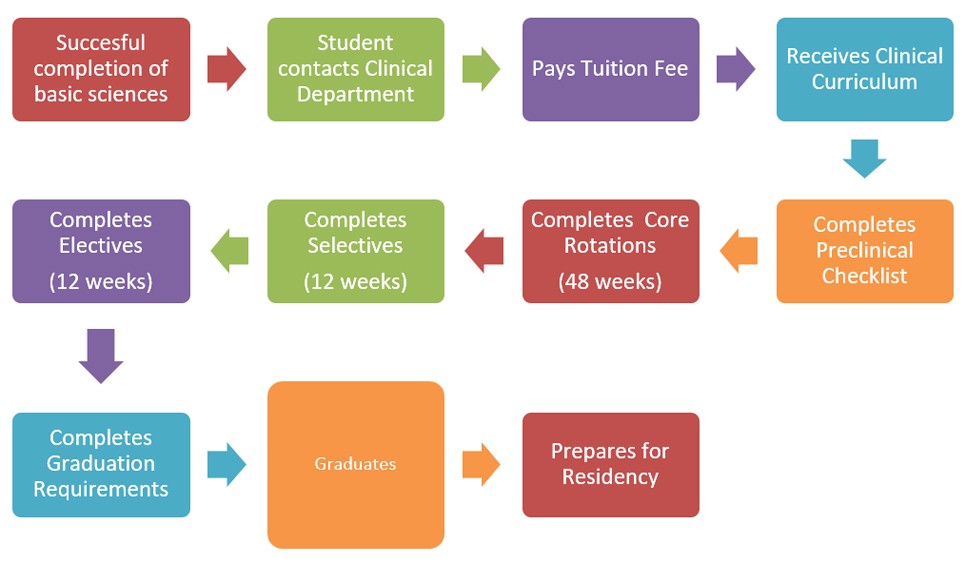
CLINICAL SCIENCE PROGRAM OFFERED IN THE CARIBBEAN
Gain an understanding of the medical curriculum offered at St. Kitts’ Windsor University School of Medicine through the detail infographic on this page. Our brochure will also help familiarize you with our programs. Additionally, you can reach us by phone or email.

A critical part of any medical education, clerkships give Windsor School of Medicine students the opportunity to apply the skills they have acquired in challenging, real-world environments for a total of 72 weeks of practical experience and instruction. Take your medical education to the next level at our St. Kitts university;
call us today.
CLINICAL CLERKSHIPS: MD 6 – 11
After successfully completing basic sciences, Windsor students are eligible to enter Clinical Clerkships, in rotation, in specific fields. There are 48 weeks of required clinical core clerkships and 24 weeks of selective and electives. The core clerkships in medicine, surgery, pediatrics, family medicine, obstetrics/gynecology and psychiatry are the basic areas of medical practice about which all physicians need to be knowledgeable. They are included in the curriculum of every medical school participating in these clerkships and provide students with an understanding of the various specializations in medicine. For more information on policies and resources kindly refer to our clinical curriculum manual. The required core clerkships for 48 weeks are as follows:
Syllabi for individual core rotations
Kindly contact your core clerkship instructors to receive your rotation-specific syllabus.
SELECTIVES & ELECTIVES – 24 WEEKS
The 24 additional weeks are spent in elective clerkships and mandatory selective clerkships; these must include twelve additional weeks of medicine, as arranged by you, which may be spent in general medicine or in medical or surgical subspecialties.
Twelve additional weeks in mandatory electives: four weeks in preventive medicine; four weeks in community medicine; four weeks of research. All electives are to be arranged as additional private financial arrangements with various medical training institutions or clinical coordinators.
Selective Rotations (12 weeks: 3 x 4 weeks)
Accident and Emergency
A 4-week Selective clinical rotation which includes in-hospital emergency patient care, creating a learning environment in which clinical competence can be achieved. In addition to acquiring knowledge and skill, students should gain the ability to gather essential and accurate patient information by medical history and physical examination. View our Emergency Medicine syllabi.
Community and Preventative Medicine
Required: 4 weeks in Public Health, Child or Adult Protective Services, Family Medicine, Rural Medicine, Addiction Medicine, Palliative Medicine, Emergency Medicine, Urgent Care. View our Preventive Service syllabus.
Research
Required, 4 weeks. Research Experience Rotation is a four-week course intended to train students in biomedical research writing. This guided-research course will emphasize proper research design and conduct, outlining of hypotheses and objectives, literature research methodologies, data analysis and presentation, references management and organization and manuscript writing. This rotation should prepare the student for conducting future biomedical research projects and writing biomedical research papers. View our Research Rotations syllabus.
Elective Rotations (12 weeks: 3 x 4 weeks)
Medical Specialties
Cardiology, Nephrology, Neurology, Geriatrics, Hematology & Oncology, Infectious Disease, Pain Management, Geriatrics, Emergency Medicine, Radiology, Dermatology, Pulmonology, Urgent Care, Gastroenterology, Pathology, and Anesthesiology.
Surgical specialties
Orthopedics, Urology, Neurosurgery, Trauma Surgery, Cardiothoracic Surgery, Vascular Surgery, Plastic surgery, ENT, and ophthalmology

